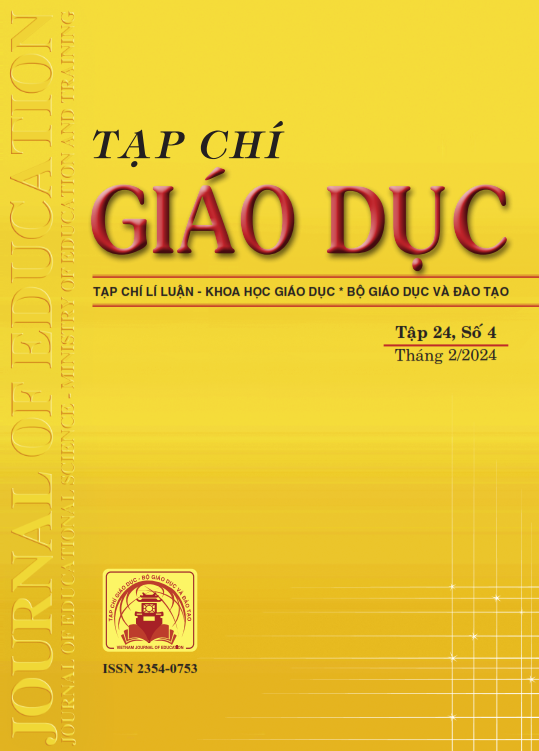Thử nghiệm hiệu quả sử dụng phương pháp thảo luận nhóm trong dạy học môn Lịch sử Đảng Cộng sản Việt Nam cho sinh viên Trường Đại học Sư phạm Hà Nội
Tóm tắt
Using appropriate teaching techniques is necessary to help students achieve the highest learning results. This study aims to evaluate the effectiveness of using group discussion techniques in teaching the course of History of the Communist Party of Vietnam at Hanoi National University of Education. The research employs the experimental cross-sectional descriptive-analytic method and conveniently sampling with 383 students of the experimental group and 187 students in the control group. The pre-test and post-test examinations and the validated questionnaire are used to collect data. The results showed that the group discussion technique improved the students' engagement in learning, cognitive and learning performance in the History of The Communist Party of Vietnam course. The use of group discussion techniques in teaching History of The Communist Party of Vietnam and other social subjects at Hanoi National University of Education is necessary to improve students' engagement and perception to bring about optimal learning achievement for the students.
Tài liệu tham khảo
Abdulbaki, K. K., Suhaimi, M., Alsaqqaf, A., & Jawad, W. (2018). The Use of the Discussion Method at University: Enhancement of Teaching and Learning. International Journal of Higher Education, 7(6), 118-28. https://doi.org/10.5430/ijhe.v7n6p118
Arja, S. B., Ponnusamy, K., Kottathveetil, P., Ahmed, T. F. A., Fatteh, R., & Arja, S. B. (2020). Effectiveness of small group discussions for teaching specific pharmacology concepts. Medical Science Educator, 30, 713-718. http://doi.org/10.1007/s40670-020-00938-9
Aryani, N. P., & Supriyadi (2018). Implementation of small group discussion as a teaching method in earth and space science subject. Journal of Physics: Conference Series, 983. http://doi.org/10.1088/1742-6596/983/1/012039
Bailey, S., Barber, L. K., & Ferguson, A. J. (2015). Promoting perceived benefits of group projects: The role of instructor contributions and intragroup processes. Teaching of Psychology, 42(2), 179-183. http://doi.org/10.1177/0098628315573147
Baker, M., & Lund, K. (1997). Promoting reflective interactions in a CSCL environment. Journal of Computer Assisted Learning, 13(3), 175-193.
Bishop, C. F, Caston, M. I., & King C. A. (2014). Learner-centered environments: Creating effective strategies based on student attitudes and faculty reflection. Journal of the Scholarship of Teaching and Learning, 14(3), 46-63. https://doi.org/10.14434/josotl.v14i3.5065
Bộ GD-ĐT (2021). Giáo trình Lịch sử Đảng Cộng sản Việt Nam. NXB Chính trị Quốc gia - Sự thật. George, D., & Mallery, P. (2003). SPSS for Windows Step by Step: A Simple Guide and Reference. 11.0 Update (4th ed.). Boston: Allyn & Bacon.
Kirschner, F., Paas, F., & Kirschner, P. A. (2009). Individual and group-based learning from complex cognitive tasks: Effects on retention and transfer efficiency. Computers in Human Behavior, 25(2), 306-14. https://doi.org/10.1016/j.chb.2008.12.008
Nystrand, M. (2006). Research on the role of classroom discourse as it affects reading comprehension. Research in the Teaching of English, 40(4), 392-412. https://www.jstor.org/stable/40171709
Nguyễn Hải Minh (2021). Thực trạng sử dụng phương pháp thảo luận nhóm nhằm phát huy tính tích cực của sinh viên trong giảng dạy môn Chủ nghĩa xã hội hiện thực tại Trường Đại học Tây Bắc. Tạp chí Khoa học, Trường Đại học Tây Bắc, 25, 81-88.
Perkins, D. V., Saris, R. N. (2001). A “jigsaw classroom” technique for undergraduate statistics courses. Teaching of Psychology, 28(2), 111-113.
Silverthorn, D. U. (2006). Teaching and learning in the interactive classroom. Advances in Physiology Education, 30(4), 135-140. https://doi.org/10.1152/advan.00087.2006
Slavin, R. E., Hurley, E. A., & Chamberlain, A. (2003). Cooperative learning and achievement: Theory and research. In W. M. Reynolds & G. E. Miller (Eds.). Handbook of Psychology, 7, 177-198. https://doi.org/10.1002/0471264385.wei0709
Sybing, R. (2015). Considerations for discussion activities for beginner EFL learners. Journal of the Nanzan Academic Society, 98, 163-169.
Van Blankenstein, F. M., Dolmans, D. H. J. M., Van der Vleuten, C. P. M., & Schmidt, H. G. (2013). Relevant prior knowledge moderates the effect of elaboration during small group discussion on academic achievement. Instructional Science, 41(4), 729-744. https://doi.org/10.1007/s11251-012-9252-3
Vojdanoska, M., Cranney, J., & Newell, B. R. (2010). The testing effect: The role of feedback and collaboration in a tertiary classroom setting. Applied Cognitive Psychology, 24(8), 1183-1195. https://doi.org/10.1002/acp.1630
Yoder, J. D., & Hochevar, C. M. (2005). Encouraging active learning can improve students’ performance on examinations. Teaching of Psychology, 32(2), 91-95. https://doi.org/10.1207/s15328023top3202_2
Tải xuống
Đã Xuất bản
Cách trích dẫn
Số
Chuyên mục
Giấy phép

Tác phẩm này được cấp phép theo Ghi nhận tác giả của Creative Commons Giấy phép quốc tế 4.0 .












